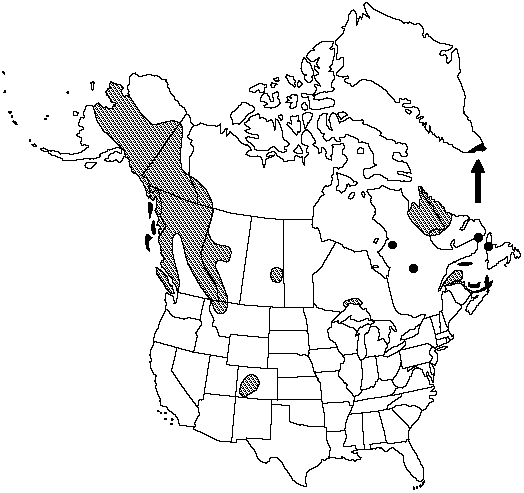Cystopteris montana
Mém. Soc. Linn. Paris 6(2,3): 264.1827.
Stems long-creeping, cordlike, internodes 1–2 (–4) cm, old petiole bases few, hairs absent; scales usually tan to light-brown, ovatelanceolate, radial walls tan to brown, thin, luminae tan. Leaves monomorphic, at stem apex but not tightly clustered, to 45 cm, sori production about equal on all leaves (fairly independent of season). Petiole dark-brown to black at base, gradually becoming green or straw-colored distally, (1–) 2–3 times length of blades, sparsely scaly throughout. Blade elongate-pentagonal, 3 (–4) -pinnate-pinnatifid; rachis and costae lacking gland-tipped hairs or bulblets; axils of pinnae with occasional multicellular gland-tipped hairs. Pinnae ascending, typically at acute angle to rachis, only proximal pinnae occasionally curving toward blade apex, margins serrate; proximal pinnae pinnate-pinnatifid, inequilateral, basal basiscopic pinnule stalked, enlarged, base truncate to obtuse; distal pinnae deltate to ovate. Veins directed into notches. Indusia cupshaped, apex truncate, hairs gland-tipped only along margin. Spores spiny, usually 37–42 µm. 2n = 168.
Phenology: Sporulating summer–fall.
Habitat: Terrestrial in wet woods or along water courses
Elevation: rare; 0–3500 m
Distribution

Greenland, Alta., B.C., N.B., Nfld. and Labr. (Nfld.), N.W.T., N.S., Ont., Que., Sask., Yukon, Alaska, Colo., Mont., Eurasia
Discussion
Cystopteris montana, the most distinctive of the Cystopteris in the flora, probably is allied to Asian species. Although this boreal species is restricted primarily to high latitudes, it occurs disjunctly at high elevations in Colorado, where its habitats are being threatened by development. Cystopteris montana does not hybridize with any other Cystopteris in the flora, but it has been implicated in the origin of the European allopolyploid C. alpina (Roth) Desvaux.
Selected References
None.
Lower Taxa
"(" is not declared as a valid unit of measurement for this property.